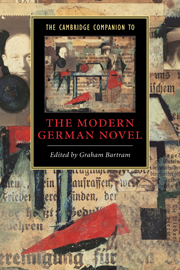Book contents
- Frontmatter
- 1 The German novel in the long twentieth century
- 2 Contexts of the novel
- 3 The novel in Wilhelmine Germany
- 4 Gender anxiety and the shaping of the self in some modernist writers
- 5 Franz Kafka
- 6 Modernism and the Bildungsroman
- 7 Apocalypse and utopia in the Austrian novel of the 1930s
- 8 Images of the city
- 9 Women writers in the ‘Golden’ Twenties
- 10 The First World War and its aftermath in the German novel
- 11 The German novel during the Third Reich
- 12 History, memory, fiction after the Second World War
- 13 Aesthetics and resistance
- 14 The kleiner Mann and modern times
- 15 The ‘critical’ novel in the GDR
- 16 Identity and authenticity in Swiss and Austrian novels of the postwar era
- 17 Subjectivity and women’s writing of the 1970s and early 1980s
- 18 The postmodern German novel
- Index
- Series List
1 - The German novel in the long twentieth century
Published online by Cambridge University Press: 28 May 2006
- Frontmatter
- 1 The German novel in the long twentieth century
- 2 Contexts of the novel
- 3 The novel in Wilhelmine Germany
- 4 Gender anxiety and the shaping of the self in some modernist writers
- 5 Franz Kafka
- 6 Modernism and the Bildungsroman
- 7 Apocalypse and utopia in the Austrian novel of the 1930s
- 8 Images of the city
- 9 Women writers in the ‘Golden’ Twenties
- 10 The First World War and its aftermath in the German novel
- 11 The German novel during the Third Reich
- 12 History, memory, fiction after the Second World War
- 13 Aesthetics and resistance
- 14 The kleiner Mann and modern times
- 15 The ‘critical’ novel in the GDR
- 16 Identity and authenticity in Swiss and Austrian novels of the postwar era
- 17 Subjectivity and women’s writing of the 1970s and early 1980s
- 18 The postmodern German novel
- Index
- Series List
Summary
Most people relate to themselves as storytellers.
(Robert Musil, The Man Without Qualities, p. 709)What kind of scope and limits should a Companion to the Modern German Novel set itself? What in particular do we mean by 'modern'?
One approach would equate 'modern' with 'contemporary', and thus focus on the novel in the here-and-now, in 'our era' - whether that era be relatively narrowly defined as the period since the Wende (turning-point) of German unification in 1989-90, or more broadly as the six decades following the collapse of Nazi Germany at the end of the Second World War. Both 1945 and 1989 mark important cultural as well as socio-political breaks in the continuum of German history, and there exists a considerable body of scholarly literature devoted to the development of the novel in these periods - as well as in the decades into which they are subdivided. To anchor ourselves purely in the 'now' would however make for a viewpoint that is inherently unstable, as well as lacking a longer-term historical perspective, and a Companion constructed around it would fairly soon be overtaken by events.
- Type
- Chapter
- Information
- The Cambridge Companion to the Modern German Novel , pp. 1 - 14Publisher: Cambridge University PressPrint publication year: 2004

